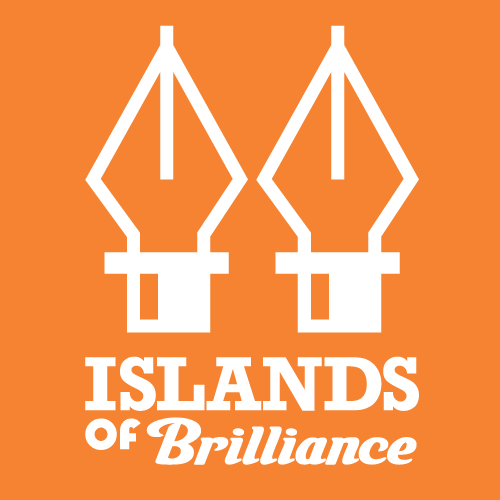Amplifying Autistic Voices
Islands of Brilliance has always been a strong advocate for the autistic community–discovering our students’ voices by giving them permission to share their passions through creativity in each of our workshops. Although talking to our students about their life experiences is a part of what we do naturally at IOB, I began to wonder if we could be doing more. How do we share the joy, passion, and ingenuity of our students with the rest of our community? What do our students want the community to know about autism and their unique life experiences? Most importantly, how can IOB serve as a conduit to AMPLIFY our autistic students’ voices?
Why it Matters
As I prepared to write this blog, I decided to look into the history behind the autism diagnosis. I had intentions of speaking to the lack of autonomy that individuals with autism faced dating back to the days of institutionalization, however, I stumbled into an even larger topic that still rings true today. You see, for decades, psychologists have been studying autistics, and professionals in the field, such as myself, have been reading their analyses of the autistic experience. From there, well-intentioned professionals have been designing experiences, interventions, and social constructs for autistics. We’ve been stuck in this sort of cycle trying to articulate the autistic experience from the lens of our neurotypical lives.
This calls the question: Why aren’t we going to the source? Why aren’t we simply talking to autistics? In an effort to become better allies, Islands of Brilliance does just that; we take the time to talk to our students. We encourage our students to use their voices to share their brilliant ideas, their imaginative storytelling, and their daring creativity with the world. It’s important to recognize that we simply cannot do better for neurodivergent thinkers if we don’t give them a seat at the table.
Discovering Our Students’ Voices
About a year ago, Islands of Brilliance discovered the concept of SpIn, a term coined by the adult autistic community that stands for special interests, and we got really excited. Finally, there was a way to describe our students’ passions in a way that truly represented the IOB philosophy! Mark, our cofounder, was so excited that he wrote a blog all about the concept of SpIn. The hubbub surrounding SpIn also has historical contexts. You see, for decades, behaviorists were representing autistic hyper fixations as thought patterns or “obsessions'' that simply hindered age-appropriate development. Practitioners were often told to interrupt these thought patterns when they emerged so that they could better train autistics to fit into neurotypical society. The results of this approach are debatable, but what’s not debatable is the prevalence of anxiety and depression in autistic individuals. The National Institute of Health suggests that between 9-26% of autistic youth and adolescents live with anxiety and depression.
At Islands of Brilliance, we come from a much different philosophy. Instead of associating SpIns with shame, we celebrate our students’ SpIns and use them as the entry point for engagement! Rather than say, “Stop talking about that and focus,” we say, “Tell me more while we create something together!”
Listening and creating together opens the lines of communication in a truly unique way. Eventually, it isn’t just about the art or learning the software, but more about the student learning to express themselves both through the art and in collaboration with their IOB mentor.
An example of Drew’s amazing progress with digital illustration.
Connection and conversation are a big part of why Drew R chooses to participate in our Brilliant Breakfast Club (BBC). He is also an accomplished artist and works with IOB staff to expand his technical skills. Like several of our students, Drew enjoys the creation of characters. It isn’t just the illustrating of them, it is creating the whole backstory of who and why they are that truly fascinates Drew. Yet, it is the personal conversations that are most meaningful and rewarding to him in all his IOB interactions.
“The best part of BBC is the conversation. Every now and then we talk about something deeper, something more personal and emotional.” He especially notes the support and help with self-confidence that he has received from Chris Willey (Director of Technology) and Matt Juzenas (Director of Strategic Operations).
In addition to working on his art, Drew has been employed for four years at the same business. When asked about finding his “voice,” he explains that “it takes time and experience to find your voice and speak up for yourself - experiencing the real world vs just your perceptions of it helps. It came naturally for me over time. In the meantime, try not to be down on yourself. Experience will eventually help you.”
I recently put out a survey to our students to see what they were passionate about. I wasn’t sure how willing our students would be to fill out this survey, but they did not disappoint! Here’s what we found out:
Overall, our students love video games, drawing, creating, and music.
Individually, our students also have a WIDE variety of interests, from voice acting to pickled herring, just to name a few.
Our students engage in their SpIns as you might expect: looking at pictures of their SpIns, watching videos about their SpIns, and sharing their SpIns with others.
Yes, you read that right: our students LOVE to talk about their SpIns. Nearly every student who filled out the survey identified a desire to share their SpIns with others. So again I ask the question: Why would we extinguish this passion? We plan to use the data we’ve collected to engage the community in experiences that are truly and uniquely born from our students’ SpIns, and this feels like a step in the right direction. We are eager to end the telephone game and turn up the volume on our students’ passions. It’s time to amplify autistic voices!



